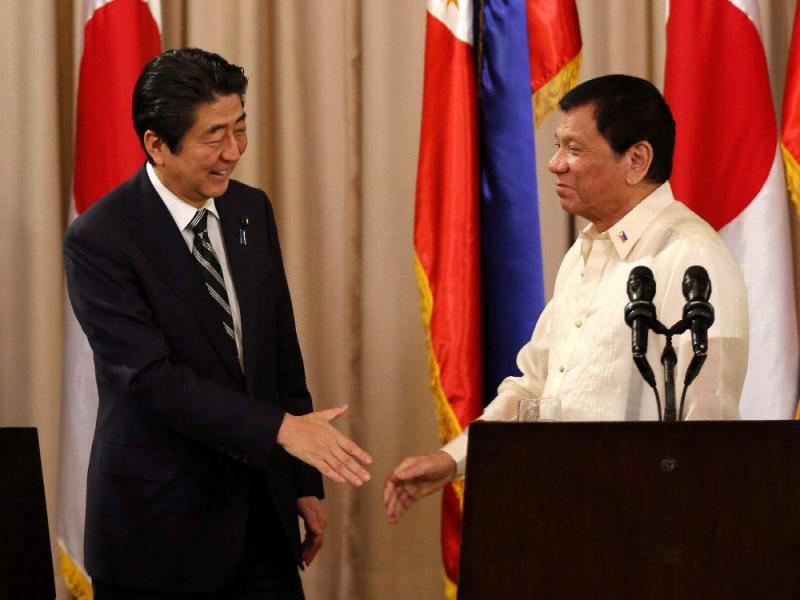
DUTERTE’S TOKYO DRIFT
Philippine leader’s Tokyo trip walks Japan-China tightrope

President Rodrigo Duterte will begin a three-day visit to Tokyo today to discuss infrastructure projects, aid and “peace and security in the region”.
Mr Duterte’s first trip last year secured $43 million in loans from PM Shinzo Abe—who welcomes support against North Korea, but also wants to limit Chinese expansion in the South China Sea. Duterte reassured Japan that there is no military alliance between the Philippines and China. Japan has pledged $8 billion over the next 5 years.
This year, after initially asking for patience, President Duterte became an outspoken critic of North Korea’s Kim Jong Un. This is contrasted with his softer stance on China, which has pledged $24 billion in aid and deals to Manila. Mr Duterte says there is “no urgency” to challenge Beijing’s interests in the disputed seas.
On this trip, expect Duterte to criticise Pyongyang, but remain passive about combating Chinese incursions in the South China Sea. This may be good enough for recently re-elected PM Abe, who won on a wave of anti-North Korea sentiment.
UNCERTAIN FUTURE
IAEA director general travels to Iran

Yukiya Amano will hold high-level talks with Iranian officials in Tehran today. The discussions are part of a regular dialogue held between the IAEA and Iran to broadly address the country’s ongoing commitment to the nuclear agreement signed in 2015.
The deal came under strain this month after US President Donald Trump refused to certify Tehran’s compliance with the agreement. The president, who must recertify the agreement every 90 days, accused Iran of committing “multiple violations of the agreement”.
Trump’s allegations have been strongly denied by his European allies, Iran, the IAEA and his own advisors. While Iran committed a minor violation of the agreement earlier this year—prior to the president’s last certification—there is strong evidence that the country has since been in compliance.
While President Trump has disavowed the deal, he has not scrapped it altogether, opting to leave the agreement’s future in Congress‘ hands. While the House imposed sanctions on Iran’s ballistic missile program on Thursday , there will likely be little congressional desire to reimpose sanctions on the Islamic Republic’s nuclear program.
MARAWI WARNING
ISIS extremists in the Philippines put SE Asia on full alert

The recent lifting of the bloody Marawi siege by the Philippine army is a stark reminder to other nations of the growing threat of extremist groups in the region. As ISIS faces complete defeat in Syria, there is concern that the jihadist cause will be taken up in Southeast Asia.
Of particular interest are the thousands of Rohingya refugees fleeing a brutal crackdown in Myanmar; they could serve as a key demographic for ISIS recruitment.
The siege in Marawi City demonstrated how highly organised and well equipped Abu Sayyaf forces are, as they were supplied through arms smuggling networks from Malaysia and Indonesia.
These cross-border networks will be a key focus of ASEAN defence cooperation in the coming year. This entails closer intelligence sharing, increased joint military operations and anti-radicalism campaigns in vulnerable regions. However, expect ISIS recruitment and resourcing to ramp up as well.

